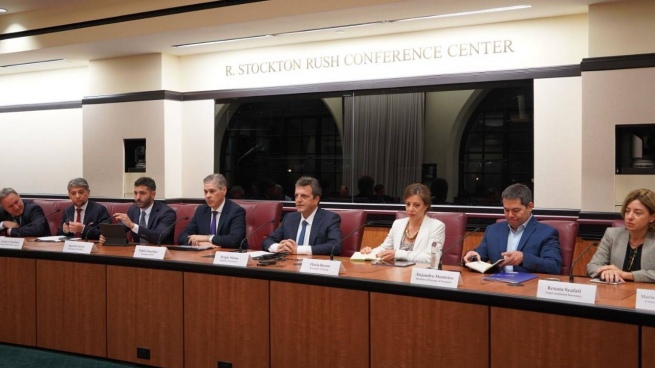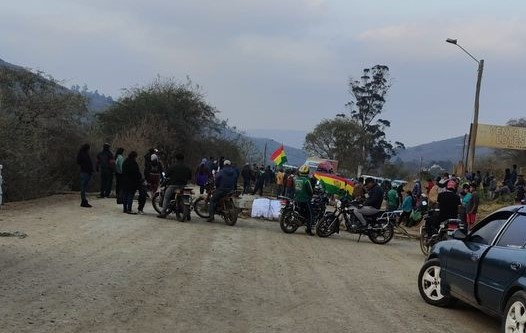The Minister of Economy, Sergio Massa, was satisfied with the results obtained by the stabilization plan that began to be implemented a little over a month ago and is sure that Argentina will meet the goals of the International Monetary Fund (IMF) in 2022 .
At a break on the sixth day of his debut international tour of the United States, he discussed with the Argentine press – including Télam – the main issues on the Argentine economic agenda, such as external and energy restrictions, on the eve of the key meeting that he will maintain with the head of the IMF, Kristalina Georgieva, and the number two of the Treasury, David Lipton.
The relationship with the IMF
“The week was good with the IMF”summarized Massa, regarding the “technical work of all areas of the Ministry of Economy with others of the Fund to close the review of the second quarter and build the prospective document” of the economy going forward”.
“The program has objectives and we have to work to fulfill them, and it is part of the commitments that Argentina assumed as a country; and in some way they put us under the obligation to assume them as a responsibility of the Government”, he affirmed when asked about the fulfillment of the program’s goals.
Two key pieces of information helped create a climate of greater relaxation, the recovery of reserves in the week after the implementation of the soybean dollar, which, as he said, “were greater than expected”, and the new support from international organizations received here, especially with the freely available credit of US$ 1,200 million from the IDB, which raised the floor of expectations of the accumulation of reserves for 2022.
Likewise, Massa stressed that it “will be transitory” and will allow Argentina to collect 5,000 million by the end of October and then meet the IMF goal at the end of the year..
Measures
“The incentive program is a program that has a start and end and a minimum commitment to liquidate cereal companies of US$ 5,000 million, and it exceeded the compliance of the first weeks with respect to the commitment,” said the official, after looking at his cell phone the internal numbers handled by his team of the 3.8 million tons that producers settled in the week.
“I understand that -he continued- the best thing that happened is that the incentive program represented a price stimulus that was reflected on the blackboard and encouraged producers to set up new operations, something that had been withdrawn because a large part of the producers had futures contracts to November and many decided to close the contracts and sell”.
In this way, he explained“the first week (of the plan) was good and the level of operations pre-registered for Monday is still high, it is very good that the banks have come out to work so hard encouraging the farmers” to liquidate.
However, Massa considered that the performance achieved could improve and slipped that there could be some type of reinforcement in the measures if the cereal companies do not transfer the new prices to the producer.
“The program has objectives and we have to work to fulfill them, and it is part of the commitments that Argentina assumed as a country; and in some way they put us under the obligation to assume them as a responsibility of the Government”
“There can be no mischief in the pricing of grain companies because it represents a value base that has to be reflected on the blackboard”he claimed.
The international situation
consulted by if he had requested something in particular in the meetings with the White House and the State Department, he ruled out that possibility and highlighted the medium-term opportunity that Argentina cannot miss in the current context of war.
“I didn’t go to ask for anything and they didn’t offer me anything, what there were were conversations about energy security and food security and, in this framework, discussions arose regarding what is the best scenario, understanding that the war was an impact on the global economy that we cannot stop putting on any discussion table”.
In this sense, he assessed that “the cost of the war is an issue that appears not only in Argentina’s relationship with the United States, but also in the global analysis, I understand that the United Nations and the leaders of the European economies are going to raise the impact of war on global economies”.
“The last quarter of the year will be marked by the impact of the war and its cost in the global economy, not only due to the increase in the price of proteins but also due to the impact on logistics prices and energy prices”complete.
Therefore, this scenario “puts us in 2023 with the challenge of having a very ambitious and professionally highly developed plan to prevent Argentina from having to continue importing the levels of LNG that it has been importing over the years and that includes the completion gas pipelines”.
Energy
In relation to the energy challenge in the short term, he said, “we have the responsibility to establish a production volume that allows us to be competitive to take care of people’s pockets.”
That requires, he deepened, “extend the Gas 4 Plan and start up the Gas 5 Plan to guarantee the filling of the gas pipeline, which requires investments to start in November, and stimulate an increase in gas production in northern Argentina”.

In parallel, he stressed that we must try to “generate a gas consumption curve that in the summer compensates for the use of hydroelectric energy, so that in winter we have a greater volume of electrical energy to compensate for what could be the LNG import peak”.
And, he concluded, “the definition of a working model with Bolivia and the energy optimization model with Brazil, among other projects of a short, medium and long-term energy plan”.
“It is key to move forward with Congress on a law with the opposition’s consensus”
The Minister of Economy, Sergio Massa, considered key for the economic development of the country “to advance with Congress in the treatment of a State policy with the search for consensus between the Government and the opposition”, translated into a new “law that regulates fiscal benefits and the legal and fiscal stability of the LNG plants”.
In a talk given to Argentine journalists -among them Télam-, Massa considered that “it is necessary to put in the same instrument the regulation for the LNG and hydrogen plants and the articles of the so-called Short Law, which finish consolidating a process of stability and availability of foreign currency”.
On a stopover on his tour in Houston, the heart of the oil and energy industry in the United States, Massa anticipated on Friday the launch of the extension of Plan Gas 4 and Plan Gas 5, and a new regulatory framework that would be sent to Congress in October, to give the sector more predictability.
It was a general request from the oil companies and service firms in the sector that held bilateral and working meetings with him.
There was a lot of expectation in the oil environment to generate long-term investments with the country, due to the maturation of Vaca Muerta and the arrival of Massa to Economy.
Here Massa is seen as one of the few who could “build a bridge” of dialogue to generate a policy for the sector that transcends government changes.
In the same rounds of meetings, Chevron and Total announced additional investments totaling US$1.03 billion by 2023.
Meanwhile, the Government, in addition to explaining the benefits of decree 2777 for new shale-oil players in Vaca Muerta, returned Chevron the benefits of decree 929/2014 as a gesture of recognition that the firm was a pioneer in unconventional oil in the country and to reach a productivity similar to that of the United States, explained official sources.
The new law is the long-term bet of the energy policy that the Government began to outline.
In the medium term, for the Government “the key is to increase production to guarantee energy supply and increase the volume of exports with uninterrupted contracts, and allow the energy balance, employment and the volume of investment in the gas and oil sector to increase “, I consider.
For them, the Government will closely follow the short-term objectives in energy matters with the extension of the Gas 4 and Gas 5 plans, and the monitoring of compliance with current investment programs.
“Argentina is going to overcome the eternal vicious circle of restrictions on the dollar issue when we have a sufficiently voluminous product construction so that its exports are a guarantee of the free functioning of the exchange markets,” he concluded.


















